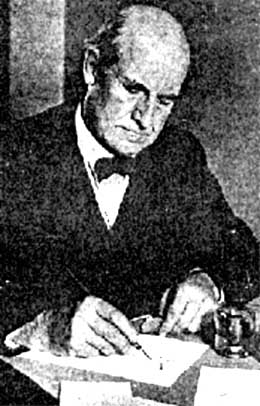On April 2, 1900, William Jennings Bryan (1860-1925) visits Seattle in pursuit of the 1900 Democratic presidential nomination. He addresses a large crowd in a circus tent at Y.M.C.A. Park (East Jefferson Street and 12th Avenue) and that evening speaks at a $1 per plate banquet at the Armory (1st Avenue and Lenora Street). Known mostly for his populist message of "free silver," Bryan stresses his stands against imperialism and trusts. In the partisan journalistic style of the day, The Seattle Times headline reads "All Seattle Turns out to Welcome the Great Leader," whereas the Seattle Post-Intelligencer announces "Bryan's Tour of Eastern Washington a Failure." Both papers agree that Bryan is a captivating speaker.
"The Great Commoner"
Bryan arrived in Seattle by train the day before from North Yakima. The crowd out to greet him stretched from Railroad Avenue (along the present route of Alaskan Way) all the way to either 1st Avenue (Seattle P-I) or 3rd Avenue (The Seattle Times). Photographs show people perched upon freight cars to catch a glimpse of the former Nebraska Congressman called "The Great Commoner" and "The Boy Orator of the Platte."
Bryan met with political leaders and reporters at the Rainier Grand Hotel before leaving by train for Bellingham that night. He returned to Seattle on Monday, April 2 and spoke to either 12,000 (Seattle P-I) or 20,000 (The Seattle Times) people at the tent rally and to "thousands" at the Armory.
After Seattle, Bryan took a steamship to Olympia and then to Tacoma.
A Populist Argument Against Imperialism
As part of his argument against the McKinley Administration's policy of occupying the Philippine Islands, Bryan told the afternoon crowd, "Why here on this coast you have killed Chinamen because they came in here voluntarily to compete with American labor. How dare you bring eight millions of Filippinos within the territory to compete with labor? My friends you have got to have those people as citizens, if they come in under our domination at all, and you cannot have them as citizens without lowering our civilization."
Bryan won the Democratic nomination for president in Chicago in 1896 on the strength of his "cross of gold" speech. Bryan and the "fusionists" advocated a shift from the gold standard for currency by coining silver. In the aftermath of the economic panic of 1893, this appealed to Western farmers and to debtors who blamed their woes on a tight monetary policy. The Republicans and their candidate William McKinley (1843-1901) supported protective tariffs and "hard money." Bryan lost that election, but continued his free silver campaign.
Limitations on His Appeal
By 1900, the economy had improved and gold strikes in the Klondike had helped increase the gold supply, so Bryan's bimetalism message was less attractive. The Spanish American War (1898) and the acquisition of Spanish colonies spurred Bryan's stand against imperialism, but the successes of the war and the opening of new markets overseas limited the appeal of that position.
Bryan also railed against trusts. Commodities such as oil (virtually every home and business used kerosene for lighting), whiskey, sugar, glass, copper, coal, and farm machinery were controlled by trusts which strangled competition and kept prices high, despite federal and state laws prohibiting them.
Failed Campaigns
Bryan won the Democratic nomination for president, but lost the election to Republican William McKinley and his running mate Theodore Roosevelt (1858-1919). Despite Bryan's warm reception in Washington, Republicans carried all state and federal races except for governor. In 1908, Bryan ran again for president, again unsuccessfully.

